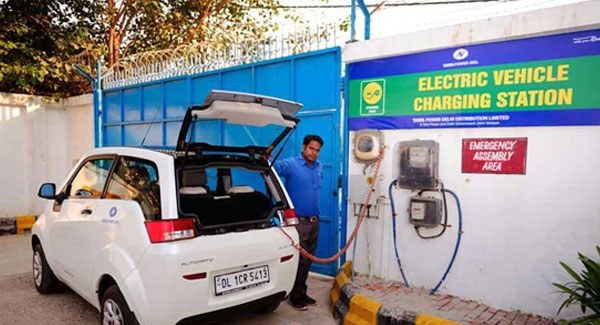Newsletter - November 14, 2018
“Fun” at any cost: Delhiites blatantly defied the ban on burning firecrackers, only to face horrendous air quality the next day. | Image credit: Indianexpress.com
Big Story: WHO aims high, Delhi goes low
Climate Science
Thinning out: Accelerating climate change could wipe out Amazon’s tree species that are unable to keep up with changing conditions. | Image credit: Huffpost.com
Amazonian trees can’t keep up with rising temperatures: Study
Global warming is changing the makeup of the Amazonian rainforest, a study has found. The species of trees that love moisture are dying because of droughts, while those adapted to living in dry conditions are likely to survive, the study says. Deforestation for agriculture is intensifying the droughts, which is exacerbating the effects already being caused by global climate change,
Antarctic’s future in deep water after plan for world’s biggest marine reserve is blocked
Russia, China and Norway have blocked a plan to turn a huge tract of the Antarctic Ocean (five times the size of Germany) into the world’s biggest marine reserve, which would have banned fishing in the vast area that is home to penguins, killer whales and leopard seals. The other 22 members of the Commission for the Conservation of Antarctic Marine Living Resources backed the proposal.
Arctic ‘no safe harbour’ for breeding birdsA new Science study has warned that species of ground-nesting birds in the Arctic are no longer safe, as global warming is helping expand their predators’ territories further north. Foxes, snakes and lizards are now becoming more of a threat to the birds’ survival, and several endangered species may even go extinct as a result.
Wealthy may donate less money than the poor to tackle climate change: Study
Wealthier people may be contributing less money to fight climate change compared to poorer people, that’s the main conclusion of the new study published in the journal PLOS ONE by researchers from three European universities. The study, which collected data from residents of Barcelona, revealed that “people with fewer resources were prepared to contribute significantly more for public good than wealthier people, sometimes up to twice as much.”
Climate change made California wildfire “more hellish”
Camp Fire, the most destructive wildfire in California’s history, has killed42 people, gutted over 1,05,000 acres, while the search for survivors continues. Los Angeles fire chief Daryl Osby said climate change made the fire more devastating, an assessment that scientists and environmentalists agree with. The deadliest fires ever in California state are a clear signal of a warming planet. ‘This is not the new normal, this is the new abnormal’, said Gov. Jerry Brown.
Climate Policy
Need to do more: India appears to be on track to at least meeting 2 of its 3 commitments to the Paris Agreement. | Image credit: Typewriterintl.com
India likely to meet two of three Paris targets before 2030 deadline
India is well on track to achieve two of its three Paris targets ahead of the 2030 deadline, according to the leaked draft of the report that the Indian government is set to submit to the United Nations (UN) by December this year. Consider this: India has to reduce greenhouse gas emissions by 33-35% below 2005 levels by 2030. It had already reduced emissions by 21% below 2005 by 2014.
Secondly, the Accord specifies that 40% of India’s power capacity will be from non-fossil fuels by 2030. It reached 35% of this target by March 2018. India is, however, not on track to create an additional carbon sink of 2.5 -3 billion tonnes of CO2 equivalent through forest and tree cover by 2030.
Countries adopt decision to monitor the use of CFC-11 at the 30th Montreal Protocol meeting
The 30th Meeting of Parties to Montreal Protocol concluded in Quito, Ecuador last friday (9th November) with governments promising to crack down on illicit use of banned pollutant, Chlorofluorocarbon (CFC). Countries have now adopted a decision that request for information to be provided on atmospheric CFC-11 levels and potential source ahead of MOP meetings.
The illegal use of CFC-11 was first brought to light by scientists in their letter to Nature highlighting high unexplained CFC-11 emissions. On further investigation by EIA, the foam insulation sector in China was identified as the root cause for illegal production and use of CFC-11.
RMI says AC units will grow 5X by 2050, India unveils world’s first National Cooling Plan
A new report by the Rocky Mountain Institute (RMI) has warned that the number of air conditioning units across the world will grow by 5 times between now and 2050. This will be driven by a warming planet, economic growth in the developing world and its rapid urbanisation.
Meanwhile India has unveiled the world’s first National Cooling Plan – to reduce the energy intensity of cooling by 25-40% by 2037. The draft plan will also target a transition to low global warming potential (GWP) refrigerants. Additionally the Department of Science and Technology (DST) has announced a $3 million Global Cooling Prize to spur innovation in promoting higher efficiency residential cooling technologies.
India makes climate change case for nuclear power, suggests promoting it
Many European countries may be phasing out nuclear power citing its risks, but India has declared nuclear energy as “important to address concerns about climate change.” India wants the UN to back efforts to promote nuclear power’s public acceptance, as it plans to more than treble its nuclear energy to 22,480 MW by 2031.
Air Pollution
Presenting, New Delhi: Post-Diwali, Delhi’s pollution monitors failed to fully capture the catastrophically high PM2.5 levels | Image credit: Reuters
310 people arrested as Delhi violates Supreme Court order
Delhi residents defied Supreme Court order limiting bursting of crackers between 8pm to 10pm, even as air quality plummeted to an all time low. Delhi-NCR air quality index plummeted to ‘hazardous’ as the PM 2.5 level hit 2000 in the north campus. The density of fine pollutants reached 1665 in a central Delhi locality whereas the safe limit is 25.
More than 300 people were arrested for flouting SC order. People were seen wearing air pollution mask while simultaneously bursting fire crackers on the eve of Diwali. As an emergency measure, the entry of medium- and heavy-goods vehicles was temporarily banned in Delhi-NCR. Besides Delhi, 41 other cities across north and central India also recorded ‘poor’ to ‘severe’ air quality levels post Diwali.
Top Court appointed panel: allow only CNG vehicles on Delhi roads
Drastic measures for desperate situation, as the capital’s air continues to be ‘severely polluted’, the Supreme Court appointed Environment Pollution Control and Prevention Authority (EPCA) has asked Central Pollution Control Board to ban all vehicles, except those running on CNG, in the capital.
Cancerous levels of Benzene found in Delhi’s air
Delhi’s air quality went off the charts with a PM 2.5 level of 945 µg/m3 (Fulbright House, November 5, Monday, 6 am). The WHO’s limit is 25 µg/m^3. Benzene (cancer-causing) levels on October 31 touched 23 µg/m3 (the acceptable limit 5 µg/m3), when Delhi was choc-o-bloc with traffic on account of Diwali preparations.. According to a study by the National Environmental Engineering Research Institute for Delhi, diesel engine exhaust contributes to 26%-58% of total benzene; 14%-23% comes from vehicle exhaust; 10-18% from evaporative exhaust; and the rest from auto repair, degreasing and natural gas.
Air in India’s capital a death sentence, say doctors
Doctors said breathing Delhi air is “like a death sentence…like smoking 20 cigarettes a day.” While executive search companies said top officers were avoiding jobs in toxic Delhi-NCR and seeking jobs in other metros such as Mumbai, Pune and Bengaluru
Not enough staff to file criminal cases, says India’s top pollution control body
India’s Environment Pollution Control Authority (EPCA) chief Bhure Lal said they don’t have enough staff to file cases or take violators to court. He also said it is hard to ban polluting vehicles without easily identifiable fuel-specific stickers, which the EPCA is in the process of issuing. Campaigners said the EPCA has the power to file criminal cases, but it is “reluctant to act”
At WHO, India commits to undertaking definite pollution reduction
India will bring down particulate matter pollution, in “definite percentage terms by 2024”. The country made the pledge at the recently held first Global Air Pollution and Health Conference by the World Health Organisation (WHO) in Geneva. The target, which will be officially announced soon, is expected to be around 30% from current levels. Meanwhile, WHO announced a global target of reducing air pollution related deaths by 2/3rd by 2030.
Emissions from diesel vehicles linked to obesity in children
According to new research, exposure to air pollution from vehicles during infancy increases the risk of children becoming obese. High levels of nitrogen dioxide, emitted by diesel engines, in the first year of life led to significantly faster weight gain later, scientists found. The World Health Organization (WHO) says that 90% of the world’s children are breathing unsafe air.
Renewables
But utilities don’t: Cheaper than coal power, solar, wind and natural gas are all now more attractive for US utilities. | Image credit: http://neweconomics.net.nz
US: New wind and solar now cheaper than coal power, could wreck Trump’s promise to revive coal
A new report estimates that generating power from new wind and solar energy projects in the US (at about $29-$56/MWh, before federal subsidies) is now cheaper than generating power from coal plants (at about $27-$45/MWh). Adding in subsidies can bring down wind power’s prices to as low as $14/MWh.
Already under fire from cheaper natural gas, this could further wreck President Trump’s promise to revive the US’ ailing coal sector. The country’s utilities are also reportedly reluctant to entertain Trump’s populist policies – that may be overturned if and when he loses office.
UK’s renewable energy capacity surpasses that of fossil fuels for the first time
The UK’s renewable energy capacity (at 41.9 GW) has overtaken the country’s fossil fuel power capacity (41.2 GW) for the first time. Its renewable capacity has tripled over the last five years, while “uneconomic” fossil fuels capacity has fallen by one-third, according to data compiled by Imperial College London.
India Power bags Albania’s first solar project
A group led by India Power Corporation Ltd. (owned by Kanoria Foundation) is set to build Albania’s first solar power station worth $79.34 million with a capacity of 100 MW. The socialist country in the Balkans wants to install 120 megawatts of solar and 70 MW of wind power by 2020.
Meanwhile solar power generation in India itself jumped 58% in Q3 2018 (over Q3 2017).
In Chandigarh: Not installed solar panel yet? Expect a notice soon
Indian city Chandigarh’s deadline to install mandatory rooftop solar power at residential properties is set to expire on November 17. The union territory plans to issue notices to those who have failed to do so. Houses and societies measuring 500 square yards and above have to comply with the order.
Govt extends bid deadline for 10 GW solar tender bid again, increases tariff ceiling
There are no takers yet for the Indian government’s huge 10 GW solar project, with compulsory component of 3 GW of domestic manufacturing. The Solar Energy Corporation of India (SECI) has extended the bid submission deadline for the fourth time, to November 19, and increased the upper tariff ceiling by 10 paise, from ₹2.75 (~$0.03802)/kWh to ₹2.85 (~$0.03940)/kWh.
Colorado governor-elect sets US’ most ambitious renewable goal
Jared Polis, Colorado’s newly elected governor, has set the US’ most ambitious renewable goal — he wants to run the state only on renewable power by 2040 (faster than California’s and Hawaii’s 2045 target.)
Single-window clearance to process green energy applications in Goa
EU-India, in a joint venture, have developed single window online clearance for grid connected rooftop solar installations in Goa. Once launched, the platform will eliminate the need for consumers to coordinate with government departments. All they will have to do is logon, after which they will be contacted on email and SMS, and guided through the process.
Wind turbines killing affecting the numbers of predatory birds in India’s Western Ghats: Study
A new study has revealed that wind farms are affecting the biodiversity hotspot of Western Ghats, which line India’s western peninsula, as they have led to the deaths of several of the region’s predatory birds. This, in turn, may be increasing the local density of their prey, the fan-throated lizards.
Electric Vehicles
He can own one too: The Centre’s new policy will soon allow individuals in India to set up their own EV charging stations. | Image credit: Hindustantimes.com
Centre to allow individuals to set up EV charging stations
Centre to allow individuals to set up EV charging stations
The Centre will soon allow individuals to set up their own EV charging stations. No license will be required, although the stations will need to fulfil standards notified by the Power Ministry. However, the tariffs the station owners can charge from EV owners are likely to be capped by respective state governments.
ChargePoint splits major charging plan equally between US and Europe
ChargePoint (partly owned by BMW and Daimler), one of the world’s largest EV charging grid firms, plans to split a major expansion plane equally between Europe and its home market the United States. The company is aiming for 2.5 million charging points globally by 2025. Europe is seen as potentially moving more quickly to electric vehicle adoption than the United States after President Donald Trump pulled out of the Paris climate agreement.
China-based company to supply, run 25 electric buses in Pune
China-based company BYD will supply and maintain 25 electric buses in Pune. As many as 125 electric buses are expected to join the Pune fleet on January 26 next year. The company will supply and operate 25 nine-metre-long buses for the transport utility. The fleet will be a mix of 12m and 9m long buses.
VW looks at converting its Emden plant to build electric cars
Volkswagen plans to convert its factories in Germany’s Emden and Hannover to build electric cars, German daily Handelsblatt reported. The carmaker is preparing to ramp up sales of electric cars as it struggles to make its combustion-engined vehicles comply with more stringent emissions rules introduced in the wake of a diesel-emissions cheating scandal.
Fossil Fuels
IEA’s World Energy Outlook 2018 says global coal use peaked in 2014 | Image credit: Theenergyadvocate.co.uk
IEA: Global coal use possibly peaked in 2014
IEA’s World Energy Outlook (2018) estimates that global coal use may have peaked in 2014, and that despite a 25% projected rise in energy demand by 2040, coal use – going forward – may remain flat.
Instead the difference may be met by a combination of solar, wind and bioenergy, along with oil, natural gas, hydro and nuclear power. Nevertheless, IEA says even this would be insufficient to keep global warming to “well below 2C”, and warns that the world may in fact warm by 2.7C under current energy policies.
Generali joins LLoyd’s, Axa and Allianz, announces exit from insuring coal
Italian insurance company Generali has announced it will stop insuring new coal mines and coal power plants. It will also not cover coal-related assets for new clients. Generali is Europe’s third largest insurance group and now joins Lloyd’s (UK), Axa (France) and Allianz (Germany) in stepping up its climate action.
The group may additionally disinvest its shares and bond holdings in coal firms before they mature, and invest up to €3.5 billion in green businesses by 2020.
India: Industry paying twice the price for coal amidst deepening supply shortages
India’s cement, steel and aluminium manufacturers are having to pay twice the price for coal as compared to thermal power plants (supplies to whom have been prioritised) as stocks for the fuel have plunged to their lowest in 5 years.
However, Coal India Ltd. has said it will ramp up its daily output to 1.8 – 2 mt (from 1.6 mt) to curtail the shortages. India’s coal imports have also risen by 7.9% (year-on-year) for January-September 2018.
BHP defends coal mining despite criticism, Japan’s steelmakers echo need for coking coal
Andrew Mackenzie, chief of Australian mining giant BHP, has defended the firm’s strategy to continue mining coal – both for manufacturing steel and for producing cheap energy in developing nations – despite the fuel being criticised as “toxic” and “expensive” by former UNFCCC climate chief Christiana Figueres, and the dire warnings of the IPCC 1.5°C report.
Mackenzie has particularly stressed that steel production did not yet have a viable alternative to using coking coal, and so BHP would instead invest in carbon capture and storage technologies.
Some Japanese steelmakers share the concern, who say coking coal-fired blast furnaces are essential to producing high-quality steel. This is despite competitors like China already moving towards electric furnaces.
Shell and Total only two Big Oil firms disclosing carbon emissions from sold products
A new Transition Pathways Initiative report has found that Royal Dutch Shell and Total SA are the only two firms out of the 10 largest Big Oil entities disclosing – to investors – the carbon emissions of their retailed products.
They are also the only major oil and gas extractors to have a well-defined strategy to reduce their operational carbon intensities, to bring them more in line with the Paris Agreement. This could help them attract preferential treatment — over BP, Eni SpA and ConocoPhillips — from climate-conscious investors.







